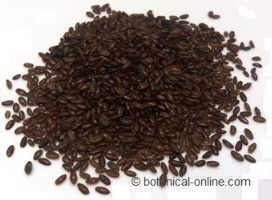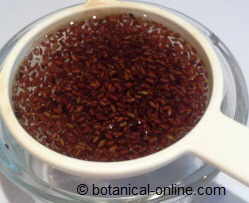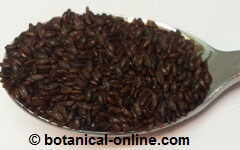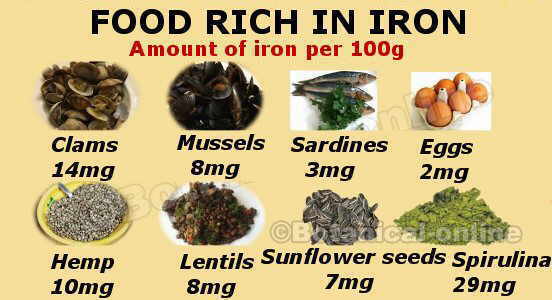Benefits of pysillium seeds
What is psyllium?
Psyllium or Ispaghula are some plants of Plantago gender (Plantaginaceae), among which two of them are very used as a folk remedy, Plantago psyllium and Plantago ovata
Although the rise of popularity of these plants is mainly due to supplements obtained from their seeds, we should not forget that both belong to the genus of plantains and exhibit similar medicinal properties to those described in greater plantain (Plantago major).
What are these plants used for?
 Psyllium seeds (P. psyllium) |
Psyllium husks or psyllium seeds are mainly used as food supplement because of its richness in mucilage, a type of soluble fiber, for cases of constipation, hemorrhoids or high cholesterol.
Medicinal properties of psyllium or psyllium husks
Psyllium regulates the intestinal rhythm
Psyllium seeds or plantains (Psyllium spp.) are very rich in mucilage, a fiber type. This type of fiber, when ingested, has the ability to absorb much water and swell inside the intestine, forming and bulky stool. This stimulates the intestinal muscle, leading to peristalsis (bowel movement), which favors evacuation.
Because of these properties, psyllium or psyllium preparations, sold in capsule, powder or chewable tablets, are used for many many intestinal problems:
– Constipation: Increased size that this substance produces after absorbing water, causes an increase in peristalsis or bowel movements, leading to the need for evacuation.
At the same time mucilage exerts a softening function on the intestinal wall so that this plant can help evacuate without being aggressive or irritating.
Unlike other cathartic high-anthraquinone plants, it does not cause pain or cramps in the womb, or it does not present the danger of abuse of laxatives (intestinal dependency, cramping, etc.).
– Diarrhea: Although it may seem paradoxical, for the same reason, reducing excess water in the intestine, gives greater consistency to the stool and helps cure diarrhea.
The absorptivity of soluble fibers helps prevent watery diarrhea. These properties can be exploited to treat irritable bowel problems, ulcerative colitis or Crohn’s disease, for example, by adding 1 teaspoon of pysillium preparation to yogurt or salads.
– Hemorrhoids: By means of producing bulky stools and because of softening hard stools, psyllium helps defecate more easily and, consequently, no pain or injuries occurs, such as it often takes place in people having hemorrhoids and constipation at the same time. This property is very convenient in other rectal conditions such as anal fissures or inflammation of the rectum or anus.
– Aid in the prevention of diverticulosis and diverticulitis treatment. Its use prevents or ameliorates constipation which is the most common cause of these abnormalities. The dose is one daily teaspoonful taken in a glass of juice or water. Drink two liters of water a day if this supplement is used.
Psyllium fiber for weight loss diet
 Psyllium seeds hydrated overnight. Around each seed an aqueous gel has appeared (mucilage captures water forming a gel) |
– Weight Loss: This supplement helps mitigate the sensation of hunger. The fiber ingested removes the feeling of hunger between meals and can be used as a resource to address the problems of obesity or diets.
– Cholesterol: It has been shown that ingestion of this product helps lower cholesterol by blocking its absorption. For this reason, psyllium or psyllium often appears as supplemental dietary product in cereals.
– Gallstones: Similarly it has been observed that, by eliminating cholesterol, no so much of it is deposited in the bladder, so people who take this supplement are less likely to develop gallstones.
Psyllium fiber to treat diabetes
– Diabetes diet: Seeds of psyllium or psyllium serve to help improve sugar control for people with diabetes, by delaying the absorption of carbohydrates. To do this, you take with meals. A diet rich in fiber can improve or prevent adult-onset diabetes, but in case of insulin-dependent diabetes, should consult a physician before taking this supplement.
How to take psyllium or ispaghula seeds?
Dosage: The maximum dose is about 30 gr. daily, divided into 3 doses, the most common being about 10 gr. daily.
You should drink lots of water – at least two liters a day – to avoid intestinal obstructions.
It usually takes effect in a period between 12 and 24 hours after ingestion.
 Psyllium seed (P. psyllium) Psyllium seed (P. psyllium) |
Contraindications of psyllium or ispaghula seeds
At allowed doses, there is no toxicity, although sometimes you can have intestinal bloating and flatulence.
More rarely there may be cases of allergy that manifests immediately as itching, skin rashes and even respiratory distress. In case of these symptoms, you should go to the doctor quickly.
Being a fiber supplement, it accelerates intestinal transit and can hinder the absorption of some medications. For this reason, people under drug treatment should consult the doctor before taking this dietary supplement.
In case of pregnancy, consult with your doctor before taking this supplement.
![]() More information on another seeds
More information on another seeds








